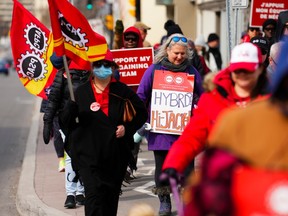The union says the agreement includes a total compounded wage increase of 12.6 per cent over four years, new remote-work language, and protections related to contracting out.

The Public Service Alliance of Canada (PSAC) and the federal government have reached a tentative agreement on a new contract. The union says it includes a total compounded wage increase of 12.6 per cent over four years, new remote-work language, and protections related to contracting out.
After 12 days of picketing, and intense bargaining over the weekend, the union said it had made a deal for the four bargaining groups under the purview of the Treasury Board.
More than 120,000 workers were expected to stop their pickets and return to work at 9 a.m. Monday morning or for their next scheduled shift.
The deal must still be ratified by PSAC members.
“In this tentative agreement, PSAC has secured a fair contract for members that exceeds the employer’s original offer before the launch of strike action, and provides wage increases above the recommendations of the Public Interest Commission as well as those negotiated by other federal bargaining agents,” said a PSAC statement. “It also provides significant new protections around remote work for PSAC members.”
President of the Treasury Board Mona Fortier said in a statement released Monday morning that the tentative agreement is “fair, competitive, and reasonable, and bring(s) stability to public servants and Canadians.
“We are pleased to have reached tentative agreements with the Public Service Alliance of Canada for the Core Public Administration after many weeks of hard work, negotiation, and compromise,” Fortier said.
Talks between the Union of Taxation Employees-PSAC and the government over a contract for Canada Revenue Agency workers were set to continue as key bargaining issues of telework, wages, and job security remain. These workers were expected to continue their pickets at CRA buildings.
What does the deal include?
The agreement, which PSAC said is a “testament to the hard work and dedication of PSAC members who held the line on fair wages and better working conditions” includes compounded wage increases of 12.6 per cent from 2021 to 2024, according to the union, which indicated that it had secured an additional fourth year in the agreement to protect workers from inflation. The government, which characterized the wage increases only as an 11.5 per cent boost, said the agreement takes workers through to the summer of 2025.
On the wage front, the union said the agreement calls for a raise of 1.5 per cent for 2021; 4.75 per cent for 2022; three per cent plus a wage adjustment for 2023; and 2.25 per cent for 2024. The deal also includes a pensionable $2,500 one-time lump sum payment for bargaining unit members.
In a statement released Monday morning, the government characterized the wage increases as an 11.5 per cent boost and said the agreement would take workers through to summer 2025.
The Treasury Board explained the difference in the overall wage increase announced by both sides, telling this newspaper that the tentative agreements include “a collection of group-specific allocations, including salary band adjustments, shift premiums and other allowances. This includes the 0.5% referred to in our news release and the PSAC’s communications. The 12.6% represents the compound wage increase plus a 0.5% adjustment.”
“During a period of record-high inflation and soaring corporate profits, workers were told to accept less — but our members came together and fought for better,” PSAC National President Chris Aylward said in the statement. “This agreement delivers important gains for our members that will set the bar for all workers in Canada.”
The deal outlines what the union called “new and improved remote work language.” Under the tentative agreement, there is now a universal process that needs to be followed across the public service where managers must assess remote work requests individually, providing members with written responses. If a request is unreasonably denied, the union said workers now have a recourse to escalate a request to another level. The new language, according to the statement, will also allow for the creation of joint union-employer departmental panels to address issues related to the government’s application of the remote work directive in the workplace, which the government said hasn’t been reviewed since 1993.
According to the union, the agreement also includes language around contracting out such that, in the event of layoffs, members won’t lose their job if they can perform the duties of a contractor already working with the federal government. PSAC said Treasury Board also agreed to a consultation process on issues associated with contracting out.
Also included in the deal are a commitment to review the bilingual allowance, an increase to shift premiums, leave for union business and other types of leave, measures to create a joint committee to review training around employment equity, diversity, and inclusion, and an agreement to submit a joint proposal to the Public Service Commission of Canada to include seniority rights in the Workforce Adjustment process.
PSAC said several wage adjustments and other improvements have also been secured and will be announced shortly.
At a media availability Monday afternoon, Fortier said the agreements were “excellent news” for employees and Canadians.
“This wasn’t easy,” Fortier said. “We negotiated, we compromised and we found creative solutions, and after many long days, nights and weekends of hard work, we’ve reached fair and competitive deal for employees.”
PSAC’s regional executive vice-president for the National Capital Region Alex Silas said the agreement represented a win for the union’s members, adding that the union was able to make significant gains on its priorities of wages, remote work, anti-oppression training, and improved job security language.
“The reason we’ve been able to make those gains is because PSAC members showed up, they came out in record-setting numbers,” Silas said. “This was the biggest strike in the history of Canada and workers in the federal public service sent a strong message to this government and any government that follows that we’re ready to fight for the fair wages and fair contract we deserve.”
Silas said he’s proud the union made significant steps forward and will be prepared for the next round of bargaining, with the contract expiring in 2025.
“We’re confident that we squeezed every last drop of juice out of that lemon and we got the best deal we could in this round,” Silas said. “Canadians and workers in the federal public service deserve better than a federal government that drags its feet for for two years, we hope they will be better prepared next time to negotiate a fair deal.”
How did we get here?
The strike, which marked the largest federal public service work stoppage since 1991, was launched April 19 for more than 35,000 Canada Revenue Agency workers and more than 120,000 workers in departments and agencies under Treasury Board.
While only about 35 per cent of union members in the core public service cast a ballot, according to a federal labour board ruling, those who did so were overwhelmingly in support of the strike, with more than 80 per cent voting in favour of joining the picket lines.
Members’ support remained strong throughout the strike, with Treasury Board data indicating that an average of roughly 71,000 (or 60 per cent) of workers from the four striking PSAC bargaining units under Treasury Board withdrew their services on any given day. The agency said the rest of the staff were workers who had been deemed essential, had chosen to work, or were on leave for other reasons.
All but around 48,000 workers who were deemed essential across the PSAC groups were expected to report to a picket line during the strike, for four hours a day, in order to receive their strike pay.
Of the essential workers, 37,000 were employees working in Program and Administrative Services, 3,500 in Technical Services, 5,300 in Operational Services, 1,000 in Education and Library Sciences and 1,400 at the Canada Revenue Agency.
Strikers picketed across the country
During the strike, union members gathered at more than 250 picket locations across the country from Corner Brook, Nfld. to Victoria, BC. Locations included government offices, Service Canada centres, offices of MPs, correctional facilities, Royal Canadian Mounted Police stations, military bases, and border crossings. In the capital region, workers gathered at nine locations throughout the strike, including Tunney’s Pasture, Orléans and Gatineau, with the largest demonstrations taking place in downtown Ottawa.
While the union first took the approach of picketing that would cause as little disruption to Canadians as possible, during the second week of the strike PSAC ramped up its efforts, blocking access to government buildings and holding up traffic in the nation’s capital as well as “shutting down” ports in Montreal, Vancouver and St. John’s.
In light of the strike, many government services and programs, from passport offices to tax returns to immigration applications, were delayed or unavailable. The delivery of passports was limited to clients experiencing humanitarian or emergency situation. The Canada Revenue Agency warned Canadians to expect delays processing tax returns during the busiest season for the agency. Immigration applications were reported to be further delayed. Veterans were warned they might struggle to sign up for new benefits.
Going into bargaining, PSAC called for 4.5-per-cent annual wage increases (13.5 per cent over three years) for Treasury Board members; and 4.5 per cent, eight per cent, and eight per cent (20.5 per cent in all) over the same period, in addition to a one-time wage adjustment of nine per cent, for CRA members.
A day before the strike began, Treasury Board insisted that the government had offered a “fair, competitive offer” to PSAC of a nine per cent increase over three years and that it had “responded to all their demands,” including proposals related to telework, shift premiums, improved leave with pay for family-related responsibilities and measures to support employment equity and diversity and inclusion, though it didn’t provide details on what proposals had been made.
The union head told reporters on April 26 that PSAC would not accept the nine per cent, even if the government opened up on everything else.
The CRA indicated in a statement that it had offered its workers the same nine per cent wage increase over three years. The government said the union countered with a proposal of 22.5 per cent over the course of three years, including a market adjustment of two per cent.

THIS CONTENT IS RESERVED FOR SUBSCRIBERS ONLY
Subscribe now to read the latest news in your city and across Canada.
- Exclusive articles from Elizabeth Payne, David Pugliese, Andrew Duffy, Bruce Deachman and others. Plus, food reviews and event listings in the weekly newsletter, Ottawa, Out of Office.
- Unlimited online access to Ottawa Citizen and 15 news sites with one account.
- Ottawa Citizen ePaper, an electronic replica of the print edition to view on any device, share and comment on.
- Daily puzzles, including the New York Times Crossword.
- Support local journalism.
SUBSCRIBE TO UNLOCK MORE ARTICLES
Subscribe now to read the latest news in your city and across Canada.
- Exclusive articles from Elizabeth Payne, David Pugliese, Andrew Duffy, Bruce Deachman and others. Plus, food reviews and event listings in the weekly newsletter, Ottawa, Out of Office.
- Unlimited online access to Ottawa Citizen and 15 news sites with one account.
- Ottawa Citizen ePaper, an electronic replica of the print edition to view on any device, share and comment on.
- Daily puzzles, including the New York Times Crossword.
- Support local journalism.
REGISTER TO UNLOCK MORE ARTICLES
Create an account or sign in to continue with your reading experience.
- Access articles from across Canada with one account.
- Share your thoughts and join the conversation in the comments.
- Enjoy additional articles per month.
- Get email updates from your favourite authors.
Negotiations were ongoing throughout the strike, despite the parties squabbing publiclyaccusing each other of delays in bargaining, with the union repeatedly calling on Prime Minister Justin Trudeau to get involved.
Going into the second week of the strike, Fortier issued an “open letter to public servants and Canadians,” indicating that the parties had reached agreement on most of the union’s over 570 demands, noting that key issues that remained included wage increases, telework, contracting out, and seniority around layoffs.
At the same time, Marc Briere, the head of the Union of Taxation Employees, had said that very little progress had been made on the CRA side.
Fortier said last week that decisions around remote work are the right of management and shouldn’t necessarily be part of a collective agreement. Aylward responded that “almost everything” in the union’s collective agreements are managerial rights, such as hours of work.
“The argument that Mona Fortier is making that this is a managerial right and they can’t put it in the collective agreement holds absolutely no water whatsoever,” he said. “Mona Fortier should start reading some of our collective agreements.”
What are the next steps?
Now that a tentative agreement has been reached, it must be ratified. Previously, PSAC’s ratification votes have gone on for about a month, with members needing to have received a personal identification number, ensure they’re a member in good standing, and attend a 15-minute webinar session in order to be eligible to vote.
The union said a full explanation of the new agreements will be available in the coming days, with members to then be invited to participate in online ratification votes.
PSAC said its bargaining teams recommend the ratification of the tentative agreement.
Note: This article have been indexed to our site. We do not claim legitimacy, ownership or copyright of any of the content above. To see the article at original source Click Here
















